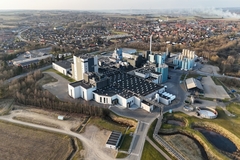
- Industry news
Industry news
- Category news
Category news
- Reports
- Key trends
- Multimedia
Multimedia
- Journal
- Events
- Suppliers
- Home
- Industry news
Industry news
- Category news
Category news
- Reports
- Key trends
- Multimedia
Multimedia
- Events
- Suppliers
Friesland Foods and Campina to Merge

The combined turnover of Friesland Foods and Campina amounts to some 8.3 billion euros. Together, they employ around 22,000 people, and between them have some 17,000 associated dairy farms in the Netherlands, Germany and Belgium.

19/12/07 Friesland Foods and Campina have started exploratory talks on whether and how a merger between their cooperatives and dairy companies could contribute more to achieving their respective objectives. Both companies expect that a merger would significantly strengthen their international positions: with consumer products, further growth in Europe, Asia and Africa: and with ingredients growth worldwide. A further strengthening and the growth of the business are in the best interest of the member dairy farmers (who would together own Friesland Campina), customers, consumers and employees.
Completion of the merger would mean the creation of one of the leading global dairy companies. The diversity in product groups, geographical markets, strong brands, and global increase in scale for research, production, marketing and sales will turn Friesland Campina into a more competitive company. A company that can respond efficiently to the constantly changing market.
The combined turnover of Friesland Foods and Campina amounts to some 8.3 billion euros. Together, they employ around 22,000 people, and between them have some 17,000 associated dairy farms in the Netherlands, Germany and Belgium. These supply a total volume of 8.7 billion kilos of milk (based on the 2006 figures).
Friesland Foods and Campina both expect that the new company, Friesland Campina, will be able to better anticipate and respond to the increasingly rapid changes in market conditions:
• far-reaching deregulation (EU/WTO);
• a strongly fluctuating global market for dairy products;
• increasing competition, regional as well as global;
• worldwide increase in consumption of dairy products.
Should the merger take place, both companies expect to accelerate the execution of their respective strategies by focusing as a single company on:
• stronger growth in brands and added value product concepts;
• larger scale production, product development and marketing and greater flexibility in the processing of milk;
• further strengthening of market and brand positions in emerging markets;
• further global strengthening of dairy ingredients activities.
The purpose of the exploratory talks is to determine whether the multinational Friesland Campina will generate additional added value for its member dairy farmers through amongst others milk price, and facilitate milk volume growth in line with the anticipated growth of the new company. Starting point is the creation of a new cooperative under the name of Zuivelcoöperatie Friesland Campina, in which at the time of the merger all the existing members of Friesland Foods and Campina will participate as equals, with the same rights and obligations, and voting rights in proportion to the volume of milk they supply. Subsequent stages of the exploratory talks will consider membership regulations, member financing and the method for determining milk prices.
The Supervisory Boards, Boards of Management, directors of the cooperative, the General Assembly of Friesland Foods and the Members’ Council of Campina all support the discussions. The Boards of Management and directors of the cooperatives have signed a letter of intent. Within this framework will be an investigation into strategy and synergies, the organisational structure needed to achieve the new company’s objectives, governance and milk regulations.
The aim is to submit a merger agreement to the General Meeting of Friesland Foods and the Members’ Council of Campina for approval by mid-2008. If things go as expected, the merger is likely to be completed in the second half of 2008.
Works councils, trade unions and government authorities have been informed about the talks.
The proposed merger has already led to Campina CEO Justin Sanders’ departure. Sanders is to stand down after more than 15 years with the dairy cooperative, roughly half of which he has spent as head of the company. “The merger will mark the start of a new era for the company, and it was therefore decided by those concerned that it would be wiser if Mr Sanders, who has set his stamp on Campina for the past 15 years, did not move to the new concern. Mr Sanders has therefore decided, in consultation with the Supervisory Board, to leave Campina now to give the merger the best chances of success,” the company said in a statement.










